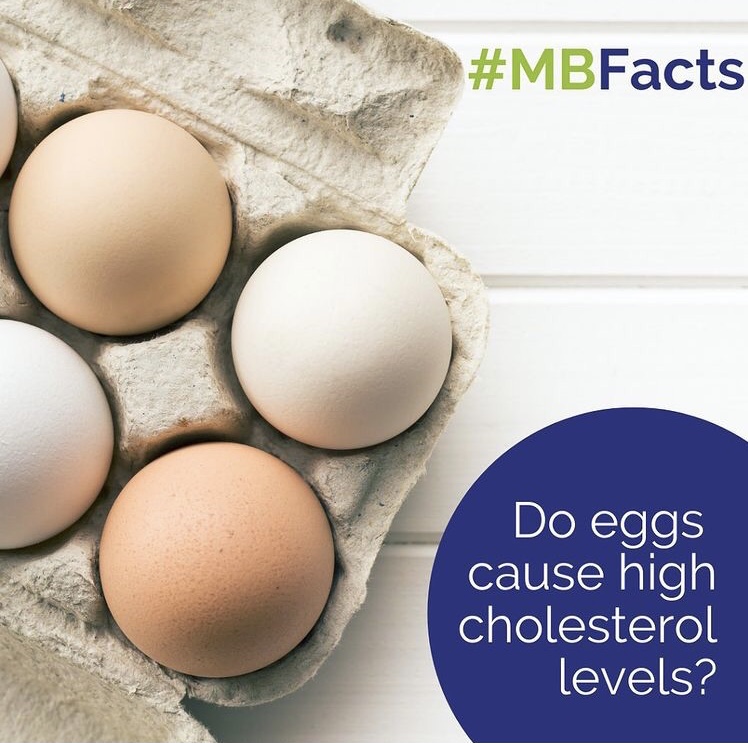Cholesterol: Facts & Myths

Part of This article is shared with permission from Metabolic Balance Canada. To learn more about the metabolic balance nutrition concept book your complimentary information session here
Many people cringe when “cholesterol” is mentioned as it is associated with unpleasant topics such as obesity and disease. Not to mention the conflicting and confusing information out there.
But what actually is cholesterol and is it really as harmful as many fear?
Who is affected by high cholesterol levels and is it enough to abstain from cholesterol-containing foods in order to protect oneself?
You will find answers to all these questions in this short summary on cholesterol.
What is cholesterol and what does “LDL” and “HDL” mean?
Cholesterol is a fat-like substance and can be found in all animal foods. Like fat, it does not dissolve in water and must therefore bind to certain proteins (lipoprotein) in order to be transported in the body via the blood (90% of which consists of water) to the various organs.
The most important and best known lipoproteins in this context are HDL (high-density lipoprotein) and LDL (low-density lipoprotein). LDL supplies the organs and tissues with cholesterol.
Excess LDL cholesterol can bind with white blood cells and deposit on the inner walls, usually the arteries, of blood vessels, leading to arteriosclerosis. If these deposits thicken over time, the blood vessels become increasingly inelastic and constrict. Hence their “badness.”
In the worst case scenario, this results in complete vascular occlusion, which can trigger coronary heart disease, stroke or heart attack. This is why there is often talk of “bad” cholesterol.
HDL cholesterol has the ability to bind excess LDL cholesterol from the blood and transport it back to the liver, which is why it is also called “good” cholesterol.
Myth 1 Cholesterol is fundamentally harmful
WRONG Cholesterol is not fundamentally harmful, in fact, it is essential to life. Cholesterol is a very important component of the human body and performs a variety of tasks in the organism. It is involved
- in the construction of cell walls and tissues
- in the formation of vitamin D
- in the formation of bile acids for fat digestion
- in the production of various hormones (cortisone, estrogen, testosterone)
Talk about an important molecule! The overall amount of cholesterol in your blood (AKA “total cholesterol”) isn’t nearly as important as how much of each kind you have in your blood.
Myth 2 – only very overweight people have high cholesterol
WRONG A high cholesterol level is not visible from the outside and does not necessarily depend on body weight. Most sufferers have no symptoms and do not notice their high cholesterol levels, so the disease often goes undetected and untreated.
Both obese and normal-weight people may be affected by an increased level of LDL cholesterol. In addition to body weight, other risk factors such as an unhealthy lifestyle with increased tobacco and alcohol consumption, lack of exercise and poor nutrition, as well as diseases such as high blood pressure or diabetes play a major role.
In addition, there is also a genetically-related metabolic disease known as familial hypercholesterolemia, in which the affected people often have a strongly elevated LDL cholesterol level already at a young age, which greatly increases the risk of developing cardiovascular disease. So even young people can have a heart attack at a very early age.

Myth 3 Eggs and cholesterol-containing foods are bad for cholesterol levels
WRONG – About two-thirds of the body’s cholesterol is produced in the liver by the body itself. Only one third is ingested through food, of which only about half is actually absorbed by the body. In healthy people, dietary cholesterol intake has little effect on cholesterol levels because the body can adjust its own production of cholesterol accordingly.
Thus, if there is a higher supply of dietary cholesterol, the body’s own production is inhibited. However, about 20-25% of the population are unable to do so, so that no adjustment of the body’s own cholesterol production takes place, resulting in elevated cholesterol levels in the blood. This adaptation mechanism can also fail to occur in the case of highly unbalanced nutrition with a high proportion of cholesterol, a lot of saturated fats, few long-chain carbohydrates, such as those found in fruit and highly processed foods, and too little fiber.
Therefore, it is much more important to develop a healthy and balanced nutrition pattern than to avoid eggs or other cholesterol-containing foods in general. Dietary fats with poor fat quality are considered a major health risk – especially in terms of elevated cholesterol levels. Saturated fatty acids, such as those found in butter, lard, cream, sausages, meat and cheese, increase cholesterol levels more than the cholesterol in food.
Trans fatty acids, which are mainly found in industrially produced foods such as fried foods, pastries, confectionery and convenience foods, also have a negative effect on cholesterol levels, as they increase the “bad” LDL cholesterol and lower the “good” HDL cholesterol.
Nutrition tips: Book a complimentary learning session here
In order to control cholesterol levels through nutrition, the most suitable diet is one that is high in fibre-rich foods such as oats, pulses, apples and vegetables that inhibit cholesterol.
In addition to soluble fiber, plant foods also offer a special group of bioactive substances, the so-called plant sterols (phytosterols). These are particularly useful in reducing the absorption of cholesterol from the intestines into the bloodstream.
Plant sterols compete on the micelles in the small intestine with the absorption of cholesterol, so that cholesterol in the presence of plant sterols is increasingly excreted in the stool. This also means that less cholesterol is absorbed into the body, whether it is food cholesterol or the cholesterol that enters the intestines with bile acid. Plant sterols are found naturally in vegetables, pumpkin seeds, sunflower seeds or pine nuts and other nuts.
Foods high in omega-3 fatty acid content such as nuts and seeds are beneficial in small amounts and support the cardiovascular system. Green tea rich in cell protective antioxidants, and Saponins which can bind cholesterol and inhibit fat absorption from food.
In addition to abundant fiber and phytosterols, vegetable foods also provide a high proportion of other secondary plant substances (carotenoids, polyphenols, sulfides, etc. ), which may protect LDL cholesterol from oxidation. The free radicals that accumulate in the body during the metabolic process or due to stress are absorbed by the antioxidants and thus prevent them from joining with the cholesterol-containing fat particles.
Avoid hidden fats
The quality of dietary fats also has a major influence on the concentration of lipoproteins. Neither cholesterol nor fats are “dangerous” substances, but essential to life. The problem is usually that too many fats with an unfavorable fatty acid composition are consumed. A scientific study shows that on average 70 % of the daily amount of fat is absorbed as hidden fat (e. g. in sausage, cheese, chocolate, sweet pastries, snacks etc. ). However, it is now known that the fatty acid pattern in nutrition influences the composition, size and oxidation tendency of LDL cholesterol.
Conclusion:
In the Metabolic Balance program, analysis of specific blood values including total cholesterol, HDL and LDL but also inflammatory markers, glucose and triglyceride values are taken into account in order to be able to make the appropriate nutrition recommendations. Simply avoiding foods high in fat and cholesterol can only reduce elevated cholesterol levels to a limited extent.
With the Metabolic Balance nutrition concept and the individual selection of foods, the basis for a healthy cholesterol level is laid. In addition, daily exercise, limiting alcohol, reducing stress can have a positive effect on cholesterol levels.
If you want to go deeper into the topic? Read the in depth article by Silvia Bürkle, nutritionist and co-founder of Metabolic Balance, and Pia Funfack, Facts worth knowing, Cholesterol in check by visiting www.metabolic-balance.ca

